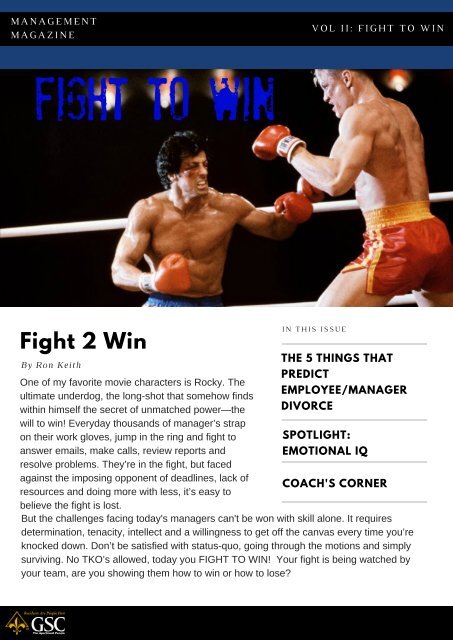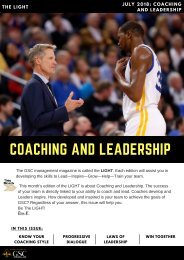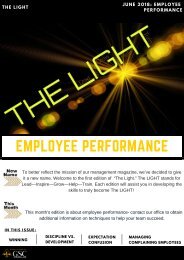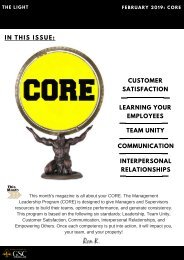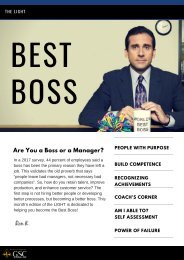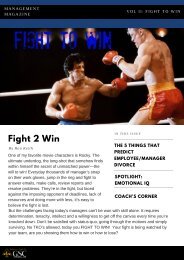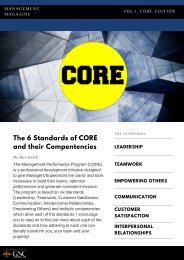Fight to Win
Create successful ePaper yourself
Turn your PDF publications into a flip-book with our unique Google optimized e-Paper software.
M A N A G E M E N T<br />
M A G A Z I N E<br />
V O L I I : F I G H T T O W I N<br />
<strong>Fight</strong> 2 <strong>Win</strong><br />
I N T H I S I S S U E<br />
THE 5 THINGS THAT<br />
By Ron Keith<br />
PREDICT<br />
One of my favorite movie characters is Rocky. The<br />
EMPLOYEE/MANAGER<br />
ultimate underdog, the long-shot that somehow finds<br />
within himself the secret of unmatched power—the DIVORCE<br />
will <strong>to</strong> win! Everyday thousands of manager’s strap<br />
on their work gloves, jump in the ring and fight <strong>to</strong> SPOTLIGHT:<br />
answer emails, make calls, review reports and<br />
EMOTIONAL IQ<br />
resolve problems. They’re in the fight, but faced<br />
against the imposing opponent of deadlines, lack of<br />
COACH'S CORNER<br />
resources and doing more with less, it’s easy <strong>to</strong><br />
believe the fight is lost.<br />
But the challenges facing <strong>to</strong>day's managers can't be won with skill alone. It requires<br />
determination, tenacity, intellect and a willingness <strong>to</strong> get off the canvas every time you’re<br />
knocked down. Don’t be satisfied with status-quo, going through the motions and simply<br />
surviving. No TKO’s allowed, <strong>to</strong>day you FIGHT TO WIN! Your fight is being watched by<br />
your team, are you showing them how <strong>to</strong> win or how <strong>to</strong> lose?
The 5 Things That Predict<br />
Employee/Manager Divorce<br />
Inspired by Dr. John Gottman<br />
Divorce occurs when employees and<br />
managers no longer operate in unison. When<br />
a manager fails <strong>to</strong> nurture the proper<br />
relationship with their team, winning<br />
becomes problematic. Below are 5 predic<strong>to</strong>rs<br />
that divorce could be eminent.<br />
1. Harsh Startup: The most obvious<br />
indica<strong>to</strong>r that a conflict discussion is not<br />
going <strong>to</strong> go well is the way it begins. When a<br />
discussion leads off with criticism and/or<br />
sarcasm (a form of contempt), it has begun<br />
with a “harsh startup.” The research shows<br />
that if your discussion begins with a harsh<br />
startup, it will inevitably end on a negative<br />
note. Statistics say that 96% of the time, you<br />
can predict the outcome of a conversation<br />
based on the first three minutes of the<br />
interaction.<br />
2. The Four Horsemen: Certain kinds of<br />
negativity, if allowed <strong>to</strong> run rampant, are so<br />
lethal <strong>to</strong> a relationship that psychologists<br />
refer <strong>to</strong> them as the Four Horsemen of the<br />
Apocalypse. Usually these four horsemen<br />
clip-clop in<strong>to</strong> the heart of an employee/<br />
manager relationship in the following order:<br />
criticism, contempt, defensiveness, and<br />
s<strong>to</strong>newalling.<br />
3. Flooding: Flooding occurs when<br />
negativity – whether in the guise of criticism<br />
or contempt or even defensiveness - is so<br />
overwhelming and sudden, that it leaves you<br />
shell-shocked.<br />
We can predict, then, by habitual harsh<br />
startup and frequent flooding brought on<br />
by the presence of the four horsemen<br />
during disagreements that a relationship<br />
is condemned <strong>to</strong> failure. Although each<br />
of these fac<strong>to</strong>rs alone can predict<br />
division, they usually coexist in a<br />
dysfunctional employee/manager<br />
relationship.<br />
4. Failed Repair Attempts:<br />
During an argument, how both parties<br />
attempt <strong>to</strong> resolve previous issues plays<br />
a major role for any positive interactions<br />
in the future. These are referred <strong>to</strong> as<br />
repair attempts. Repair attempts are the<br />
efforts both parties make <strong>to</strong> de-escalate<br />
the tension during a discussion. If these<br />
repair attempts fail, it is an accurate<br />
marker for unhappy future.<br />
5. Bad Memories: Successful<br />
relationships draw strength from past<br />
adversity weathered <strong>to</strong>gether. Take a<br />
look at the his<strong>to</strong>ry of any successful<br />
relationship and you will see that each<br />
has gone through challenges. When<br />
recollecting experiences, if a<br />
relationship has a his<strong>to</strong>ry of being<br />
unable <strong>to</strong> weather the s<strong>to</strong>rms or not<br />
having positive outcomes, there is a<br />
high probability for failure.
Leadership<br />
"A leader can be<br />
vision,<br />
is when your<br />
very destructive or<br />
very inspiring. It<br />
behaviors<br />
and<br />
synchronize<br />
comes down <strong>to</strong> their<br />
level of emotional<br />
intelligence."<br />
<strong>to</strong> inspire others <strong>to</strong> unite.<br />
John Mackey, CEO and founder<br />
of Whole Foods
To win, we must find solutions <strong>to</strong> the<br />
common problems onsite. However,<br />
this can't happen if team members<br />
aren't operating on the same<br />
wavelength. This includes verbal and<br />
non-verbal communication. Nothing<br />
creates miscommunication faster than<br />
emotions clouding our minds.<br />
SPOTLIGHT:<br />
Emotional<br />
Intelligence<br />
Emotional intelligence plays a significant<br />
role in a manager's ability <strong>to</strong> develop<br />
interpersonal relationships.<br />
As managers, the responsibility for<br />
knowing oneself is doubly important as<br />
your emotional expressions have a direct<br />
impact on the quality of conversations<br />
with employees. This consequently<br />
impacts the quality of team morale and<br />
productivity. It is easy <strong>to</strong> forget that when<br />
managing processes we foremost<br />
manage people. Employees are creatures<br />
of logic as well as creatures of emotion.<br />
They are able <strong>to</strong> sense emotional ebb and<br />
flow through <strong>to</strong>ne, body language,<br />
and the words a person uses.<br />
By becoming aware of one's own<br />
emotions and patterns, managers can<br />
begin <strong>to</strong> recognize the same emotive<br />
cues in others and work <strong>to</strong> build stronger<br />
communication skills.<br />
"Research has shown that your<br />
own emotional state affects<br />
your ability <strong>to</strong> perceive the<br />
emotions of others."<br />
- James Bradford Terrell<br />
Strategies must be in place that help<br />
managers detach and gain<br />
perspective without the influence of<br />
"high-power" emotions such as anger<br />
or frustration. Over time, these<br />
strategies allow leaders <strong>to</strong> manage<br />
their own emotional state rather than<br />
letting emotions call the shots. This<br />
creates space for conversation void of<br />
emotional charge, and a clear path <strong>to</strong><br />
solutions, as well as encourages this<br />
same self-control in team members.
Coach's Corner<br />
Today's Coach's Corner<br />
comes from Rocky Balboa!<br />
“Let me tell you something you<br />
already know. The world ain’t all<br />
sunshine and rainbows. It is a very<br />
mean and nasty place and I don’t care<br />
how <strong>to</strong>ugh you are, it will beat you <strong>to</strong><br />
your knees and keep you there<br />
permanently if you let it. You, me or<br />
nobody is gonna hit as hard as life.<br />
But it ain’t about how hard you hit; it’s<br />
about how hard you can get hit and<br />
keep moving forward. It’s how much<br />
you can take, and keep moving<br />
forward. That’s how winning is done.<br />
Now, if you know what you’re worth,<br />
then go out and get what you’re<br />
worth. But you gotta be willing <strong>to</strong> take<br />
the hits, and not point fingers and<br />
blame other people. Cowards do that<br />
and that ain’t you. You’re better than<br />
that!”<br />
FURTHER READING<br />
AVAILABLE THROUGH THE<br />
GSC TRAINING DEPARTMENT<br />
This edition's Spotlight on Emotional Intelligence comes largely from the<br />
brilliant minds of Marcia Hughes and James Bradford Terrell in "The<br />
Emotionally Intelligent Team: Understanding and Developing the<br />
Behaviors of Success". Request your business summary from the GSC<br />
Training Department <strong>to</strong>day <strong>to</strong> gain new insights on employee performance<br />
and their 7 skills <strong>to</strong> building an emotionally intelligent team .<br />
Have a request you'd like <strong>to</strong> see featured? Reach out <strong>to</strong> us at nmckinney@gscapts.com!


